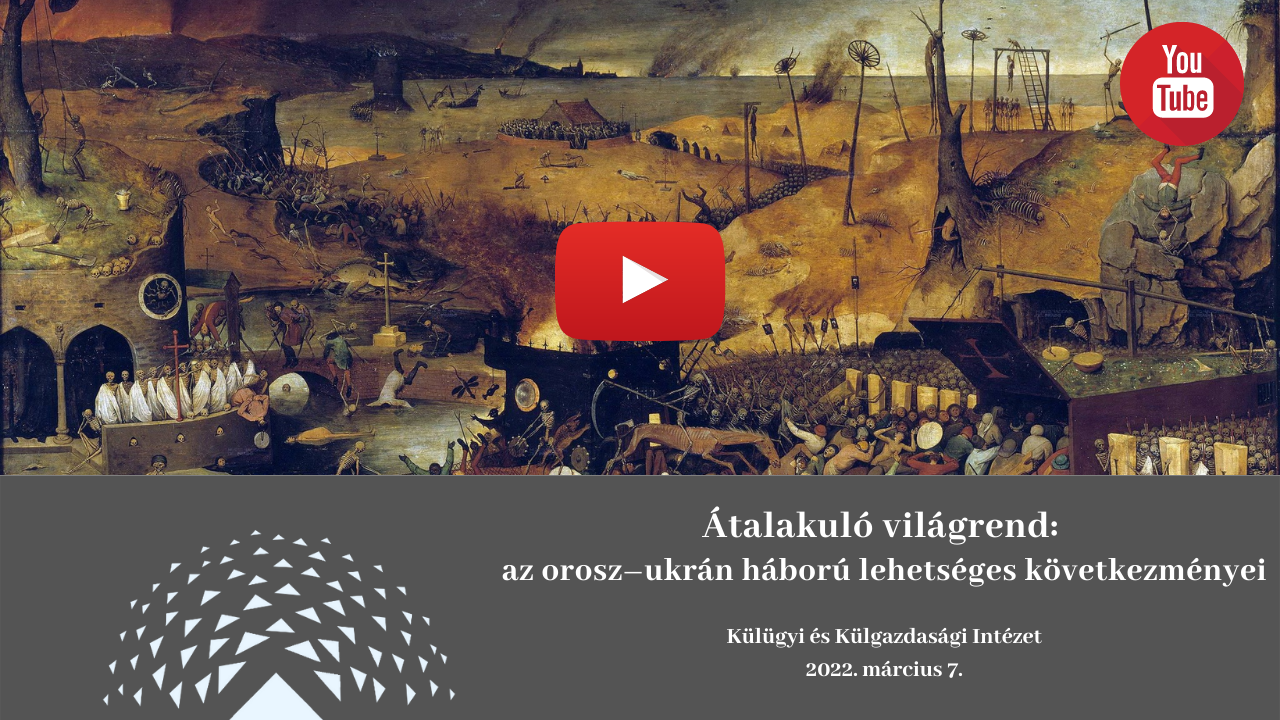On 7 March, 2022 the Institute for Foreign Affairs and Trade (IFAT) organized a Hungarian-language roundtable discussion, where research fellows and senior research fellows of the Institution, Tamás Levente Molnár, Gergely Salát, Máté Szalai, as well as Wagner Péter shed light on the current events from different perspectives and shared their thoughts on the likely consequences. The event was moderated by IFAT research fellow Nikolett Garai.
The 2014 crisis in Ukraine can be seen as a precursor to the current events and as a harbinger of the Russo–Ukrainian war and the transformation of the international system. A new chapter begins for the European security architecture vis-à-vis Russia with a heavier emphasis on the policies of defence and containment against Moscow. The erosion of the international system – that had been started earlier – is likely to accelerate, as there have already been significant signs of the end of unipolarity before the outbreak of the war. It is also becoming increasingly clear that U .S. hegemony is in relative decline. Other great powers that have previously accepted or at least recognized U.S. hegemony are now increasingly tempted to push the boundaries further off. In this context, we are now seeing Russia and China (this latter with less aggressive outlook) are also seeking to take advantage of the relative decline of the U.S.
How the international community reacts to the war and how Russia fits into the changing world order are important factors that determine the consequences. In terms of global developments, the great power rivalry will intensify, new power centers and regional middle powers may emerge, and we may witness a great power rivalry in the coming decades that had been unseen for many years.
There will also be a new chapter in European security architecture. A new iron curtain may descend across the eastern half of Europe and Europeans will experience a major “shock therapy”, which, in turn, may cause the European Union to be more integrative in security on the basis of this new convergence in threat perceptions. The main problem will be European dependence on Russian raw materials. It is almost certain that the security environment will be worsening which would entail heavy costs. It cannot be taken for granted that the European Union will emerge stronger from the first settings of the establishment of a new international order.
Others think the European Union will increasingly more rely on the United States for its security. They believe that it is not China and Russia that will form a “bloc”, but the EU and the United States, thus reducing the EU’s autonomy. The role of NATO was also discussed, as well as possible steps by European NATO members in the field of rearmament. It is questionable whether the EU will be able to make a strategic shift towards a globally relevant, convergent strategic posture in spite of the huge sums of money to be spent on weapons.
The role of China was also discussed: the Chinese government’s goal is to maintain economic stability, preferably by maintaining relations with both the West and Russia, while respecting the principle of sovereignty. In the coming years, the main goal of the Western powers will be to try to detach China from Russia, whereas the main goal of China would be to break away from Russian pressure.
Finally, experts believed that there were two scenarios about Russia’s future path. The first, and in fact the better of the two, is a Brezhnev Era 2.0 which amounts to Russian political and cultural isolation. The second is an increasing Russian drift towards the North Korean model of aggressive domestic propaganda and economic blackmailing as a normal foreign policy tool. As Western societies were struggling to make distinctions between the Middle Eastern region and Al-Qaeda as a political power since 1991, which makes it all the more expected that this perception will also prevail in the relationship vis-à-vis Russia, and thus Russophobia will further increase. In addition to the economic downturn, mass emigration is becoming a real problem in Russia.
For the full recording please click on the link below or visit our YouTube-channel!
JTNDaWZyYW1lJTIwd2lkdGglM0QlMjIxMDAlMjUlMjIlMjBoZWlnaHQlM0QlMjI0NTAlMjIlMjBzcmMlM0QlMjJodHRwcyUzQSUyRiUyRnd3dy55b3V0dWJlLmNvbSUyRmVtYmVkJTJGaEM5ZVpzMW55cmMlMjIlMjB0aXRsZSUzRCUyMllvdVR1YmUlMjB2aWRlbyUyMHBsYXllciUyMiUyMGZyYW1lYm9yZGVyJTNEJTIyMCUyMiUyMGFsbG93JTNEJTIyYWNjZWxlcm9tZXRlciUzQiUyMGF1dG9wbGF5JTNCJTIwY2xpcGJvYXJkLXdyaXRlJTNCJTIwZW5jcnlwdGVkLW1lZGlhJTNCJTIwZ3lyb3Njb3BlJTNCJTIwcGljdHVyZS1pbi1waWN0dXJlJTIyJTIwYWxsb3dmdWxsc2NyZWVuJTNFJTNDJTJGaWZyYW1lJTNF

